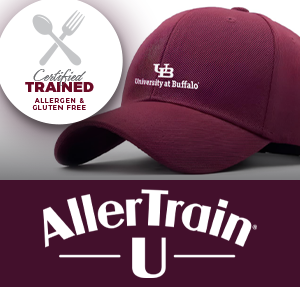Campus Dining & Shops (CDS) is committed to serving those with food allergies or intolerances. We take special diets and food allergies seriously. Students are strongly encouraged to contact our Registered Dietitian for guidance. She works one-on-one with students to develop an individualized plan that meets their specific dietary needs.
Nutrition assessment and counseling for food allergies and other dietary concerns is available with Janice Cochran, MS, RD at Health Promotion. For an appointment, call (716) 645-2837 x 0 or visit Health Promotion. For other accommodations related to a food allergy or sensitivity, call Accessibility Resources at (716) 645-2608, or visit the Accessibility Resources site for more information.
Allergen Labeling
Packaged and self-serve items in the dining centers are labeled if they contain any of the top 9 allergens or gluten. Detailed ingredient and allergen information is available at NetNutrition or by scanning the nutrition QR code. Fried foods will have “cross-contact may occur in fryer” listed on the nutrition label to alert you of any potential allergens.
Menus
Healthy options are available daily in the dining centers, including; steamed vegetables, grilled chicken, fresh fruit, brown rice, and a salad bar. In our retail operations, meals are customizable. Students can select ingredients to meet their specific dietary needs or personal preferences. While we label foods with the most common allergens, students must notify a manager before ordering to ensure their meal is prepared safely. Please keep in mind that recipes are not prepared in an allergen-free facility. We use dedicated cookware, utensils, and equipment in addition to good cleaning and sanitizing practices to prevent cross-contact in the kitchen. Students are encouraged to look ahead at the menu on NetNutrition and read allergen information before arriving in any dining location. Questions about ingredients or food preparation should be directed to a manager or the CDS Registered Dietitian.
Customized Meals in the Dining Centers
Menu options in the dining centers can be modified or individually prepared to accommodate specific dietary needs. Students may email our management team in advance or place an order through the GET Dining Accommodations Menu. For dining accommodations, please contact the CDS Registered Dietitian for more information.
Mobile Ordering/Self-Order Kiosks
Many of our retail locations offer mobile ordering through the GET app or have self-order kiosks. Students are strongly encouraged to use the “Specify Allergens” section within the app or self-order kiosk to communicate their dietary needs to management.
Students must add the allergen(s) they need to avoid to their cart before placing their order.
Please note, if no allergen(s) are specified on the ticket, management is not alerted to prepare your meal separately from other orders.
For those who are gluten-intolerant or sensitive, you can select the “non-allergy” gluten-free bread option when available. This will inform the staff that while you are avoiding gluten, additional steps do not need to be taken by management to prevent cross-contact. If you are highly sensitive to cross-contact, have a wheat allergy, or have Celiac Disease, please add “wheat/gluten” as an allergen to your order ticket and select the “allergy” gluten-free bread option.
Emergency Plan
The CDS Registered Dietitian can work with students on an emergency plan if needed. Epinephrine auto-injector devices are not available in the dining centers; therefore, we strongly advise students to carry their epinephrine device with them at all times. Managers are trained to recognize the common signs and symptoms of a food allergic reaction and to call for medical assistance immediately.
Simple Kitchen

Simple Kitchen is an access-controlled pantry for students with food allergy concerns and dietary needs located in Governors and Goodyear Dining Centers. The pantry is free from foods containing wheat, gluten, peanuts, tree nuts, fish, shellfish, and sesame.
This space reduces the risk of cross-contact by having dedicated equipment and verified ingredients. Students can safely prepare meals with ease in this home-like kitchen. For more information or access, please contact the CDS Registered Dietitian at dietitian@buffalo.edu.
Training

Allergen & Gluten Free Food Service Training: Managers and select staff have completed the AllerTrainU and AllerTrain Lite certification courses. These trainings provide the necessary knowledge and skills to safely serve students with special dietary needs— including food allergies, intolerances, sensitivities, and Celiac disease—in a university food service setting.
Managers or trained foodservice staff wearing a maroon hat and a Certified Trained pin are available to answer questions about ingredients, allergens, and preparation methods.






